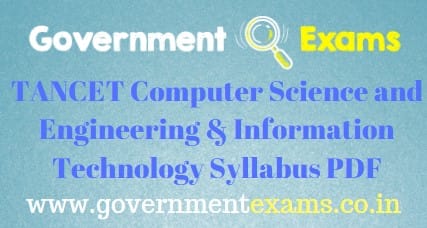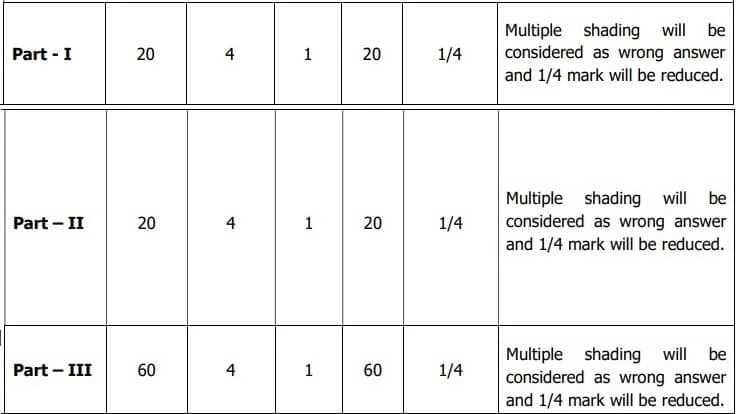TANCET Computer Science & Engineering and Information Technology Syllabus PDF:
Anna University, Chennai has officially announced the Common Engineering Entrance Test and Admission (CEETA-PG – 2024)on behalf of the Government of Tamil Nadu. Candidates are interested in M.E./M.Tech./M.Arch./M.Plan. Degree Programmes offered at university departments, and constituent colleges of Anna University can check the official notification and apply till 07-02-2024. Here we uploaded the TANCET Computer Science & Engineering and Information Technology Syllabus, Model Question Paper with answers in PDF, and Exam Pattern was uploaded and the same is given below. Candidates who took the CEETA-PG Entrance Exam can check the complete CSE & IT syllabus and Exam Pattern along with the question paper below. Check the TANCET CSE IT Syllabus PDF below:
Important dates of CEETA-PG 2024:
- Starting date for Online Registration: 10-01-2024
- Last date for Online Registration: 07-02-2024
- Downloading of Hall Ticket: 25-02-2024 (Tentative)
- Date of M.E./M.Tech./M.Arch./M.Plan Exam: 10-03-2024 10 AM to 12 PM (Sunday)
To see and check the complete CEETA-PG Exam 2024 notification and important details, check the link – TN CEETA PG 2024
For those who looking for TANCET CSE and IT previous year question paper PDF, check the link – TANCET CSE IT Question Papers PDF
TANCET CSE IT Syllabus & Exam Pattern:
TANCET Computer Science & Engineering and Information Technology M.E/M. Tech entrance exam consists of three Parts
- Part I: Engineering Mathematics – (Common to all candidates)
- Part II: Basic Engineering & Science – (Common to all candidates)
- Part III: Department Paper
Check the complete syllabus is updated below:
For the complete TANCET Syllabus 2024 PDF, Check the link – CEETA-PG CSE and IT Syllabus PDF
Computer Science & Engineering and Information Technology Syllabus – M.E/M.Tech:
PART – I Engineering Mathematics (Common to all Candidates)
– Determinants and Matrices:
– Calculus and Differential Equations:
– Vector Calculus:
– Functions of Complex Variables and Complex Integration:
– Transforms:
– Numerical Methods:
– Applied Probability:
Part – II Basic Engineering & Science – (Common to all candidates)
– Applied Mechanics:
– Mechanical Engineering:
– Physics:
– Material Science:
– Civil Engineering:
– Electrical Engineering:
– Computers:
– Chemistry:
Part – III Computer Science & Engineering and Information Technology
Applied Probability And Operations Research: Random Processes, Probability Distributions, Queuing Models and Simulation, Testing of Hypothesis, Design of Experiments.
Discrete Mathematical Structures: Formal Language and Automata – Graph Theory.
Compiler Design: Optimization – Code Generation – Implementation – Principles of Programming Languages – Programming Paradigms.
Operating Systems And System Software: Process Management, Storage Management, I/O Systems, Design and Implementation of LINUX OS, assemblers, Loaders, Linkers, and Macro Processors.
Distributed Systems: Communication and Distributed Environment, Distributed Operating Systems, Distributed Shared Memory, Protocols, Fault Tolerance and Distributed File Systems, Distributed Object-Based Systems.
Programming And Data Structures: Problem-Solving Techniques, Trees, Hashing and Priority Queues, Sorting, Graph, Heap Search.
Algorithm Analysis And Design Techniques: Dynamic Programming, Greedy Algorithms, Advanced Algorithms, NP-Completeness and Approximation Algorithms. Microprocessors And Microcontrollers – Computer Architecture And Organization: Digital Fundamentals, Combinational Circuits, Synchronous and Asynchronous Sequential Circuits, Instruction Set Architecture(RISC, CISC, ALU Design), Instruction Level Parallelism, Processing Unit and Pipelining, Memory Organization.
Digital Signal Processing: FFT, Filter Design.
Computer Networks: Data Communication Systems, Applications.
Database Management Systems: Relational Model, Database Design, Implementation Techniques, Distributed Databases, Object Oriented Databases, Object Relational Databases, Data Mining and Data Warehousing.
Software Engineering Methodologies: Software Product and Processes – Software Requirements Management – Requirement Engineering, Elicitation, Analysis, Requirements Development and Validation, Requirements Testing – Object Oriented Analysis And Design – Modular Design, Architectural Design, User Interface Design, Real-Time Software Design, System Design, Data acquisition System – Software Testing And Quality Assurance – SQA Fundamentals, Quality Standards, Quality Metrics, Software Testing Principles, Defects, Test Case Design Strategies, Software Quality and reusability, Software Project Management, Software Cost Estimation, Function Point Models, Software Configuration Management, Software Maintenance.
Artificial Intelligence: Intelligent Agents, Search Strategies, Knowledge Representation, Learning, and Applications.
Mobile Computing: Wireless Communication Fundamentals, Telecommunication Systems, Wireless Networks.
Security In Computing: Program Security, Security in Operating Systems, Database and Network Security, Scientific Computing, Information Coding Techniques, Cryptography, and Network Security.
For the complete TANCET Syllabus PDF 2023 Check the link – CEETA-PG CSE and IT Syllabus PDF
For those who looking for TANCET CSE and IT previous year question paper PDF, check the link – TANCET CSE IT Question Papers PDF


